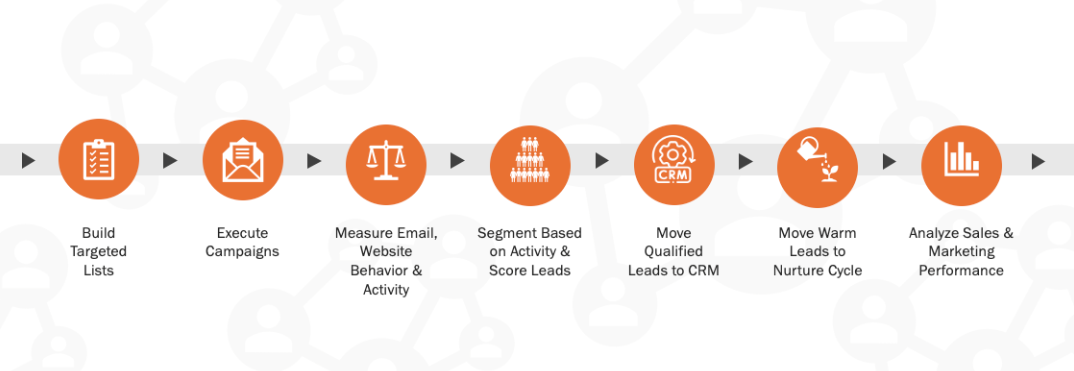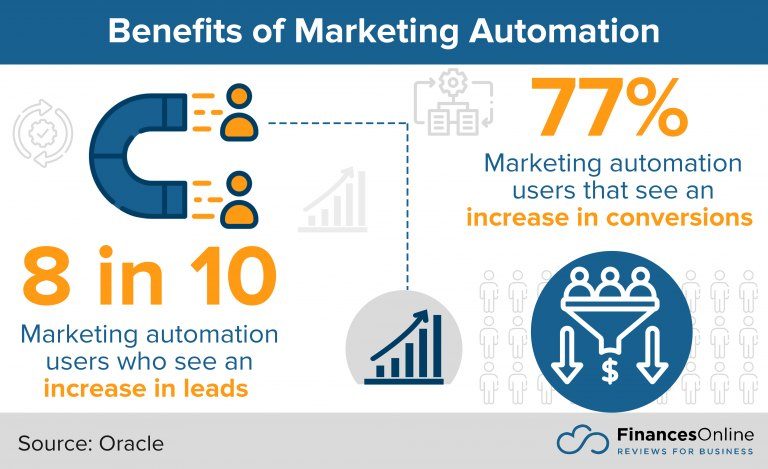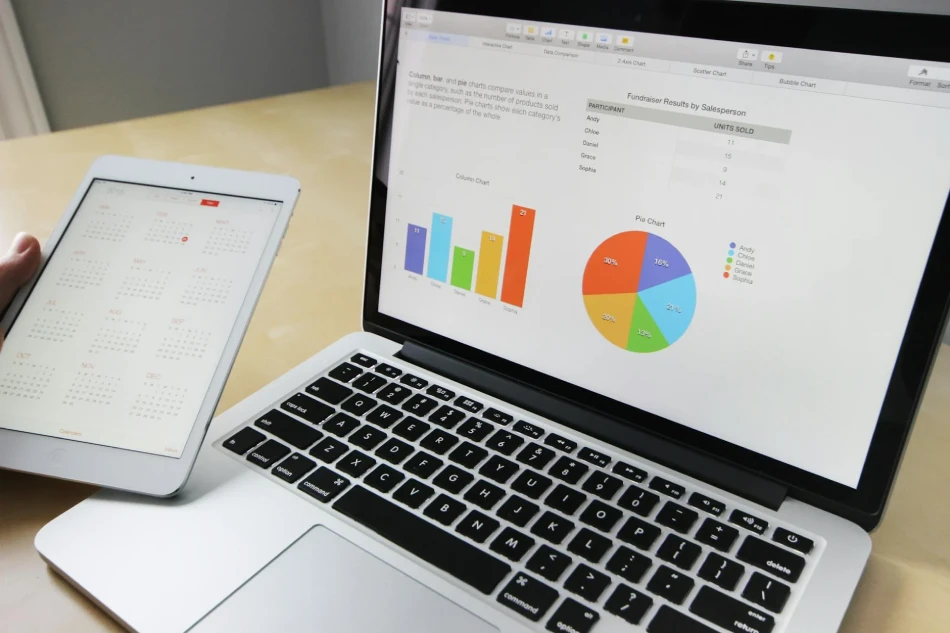Unleash the Power of Marketing Automation: Proven Strategies for Small Business Growth
Understanding Marketing Automation for Small Businesses
In today’s digital age, marketing automation is revolutionizing how small businesses engage with their customers. From Trigger-Based Email Campaigns to chatbots, small business can leverage simple automation that’s easy to use and it won’t break the bank. Embracing these tools can significantly enhance customer interactions and drive business growth. Read on to see how marketing automation can take your business to the next level.Related Articles
Combine Predictive Lead Scoring with AI to Turbocharge Your Sales Funnel
Predictive Lead Scoring Combined with AI is a Game Changer for Your Sales FunnelAre your sales and marketing teams struggling to sift through tons of leads, unsure where to focus their efforts? If so, you're not alone. The pressure to improve KPIs and close more deals...
Boost Sales with Tailored Marketing: Unlock Personalized Customer Connections
The Power of Tailored Marketing Strategies: How Personalized Approaches Can Boost Your BusinessIn today's competitive digital market, standing out is more challenging than ever. Traditional marketing tactics often fall short of capturing consumer interest and driving...
Use of Interactive Content to Capture and Retain Your Audience
How to Use Interactive Content to Capture and Retain Your Audience's AttentionAre you constantly exploring new strategies to captivate and maintain your audience's interest? With nearly 7.5 million posts published daily, capturing and retaining your audience's...
Digital Marketing Strategies for SaaS Companies
Understanding the Importance of Digital Marketing for SaaS CompaniesIn today's internet-driven world, having a strong online presence is crucial for the success of any business, especially for SaaS companies. Digital marketing has become an essential component in...
What is Marketing Automation?
Marketing automation involves using software and technology to streamline marketing processes, effectively replacing repetitive manual tasks with automated solutions. Unlike traditional marketing methods that rely heavily on manual efforts for tasks like email campaigns, social media posting, and customer segmentation, marketing automation allows businesses to nurture leads, personalize customer interactions, and analyze campaign performance seamlessly.
At its core, marketing automation allows businesses to create more personalized and timely communications with their audience. By leveraging data and predefined criteria, businesses can send tailored messages to the right people at the right time, significantly increasing engagement and conversion rates. For instance, an e-commerce company can use marketing automation to send personalized product recommendations and follow-up emails based on a customer’s browsing and purchase history, thereby fostering a more personalized shopping experience.
For small businesses, the key features and benefits of marketing automation are particularly impactful. It enables them to reach a broader audience with limited resources, tailor messaging to specific customer segments, track customer behavior, and optimize marketing strategies based on data-driven insights. By automating repetitive tasks, small businesses can focus their efforts on creative marketing endeavors and fostering customer relationships, ultimately leading to increased efficiency and growth.
Stay Informed: Sign Up for Our Blog

Statistics on Marketing Automation Adoption
The adoption of marketing automation among small businesses is on the rise, indicative of its growing importance in the business landscape. Recent statistics show that over 51% of small businesses are currently using marketing automation technology, with a significant portion planning to increase their investment in automation tools in the coming year. This trend showcases the positive impact of marketing automation on enhancing marketing effectiveness, improving lead generation, and boosting overall revenue for small enterprises.
Benefits of Marketing Automation for Small Businesses
Marketing automation offers significant advantages for small businesses, enabling them to streamline their processes and optimize their marketing efforts effectively.
As small businesses continue to recognize the benefits of marketing automation in driving business growth and enhancing customer engagement, the adoption rates are expected to climb steadily. Embracing automation technologies empowers small businesses to compete more effectively in their respective markets, adapt to changing consumer behaviors, and stay ahead of the curve in the dynamic digital marketing realm.

Improved Lead Generation and Nurturing
Marketing automation tools play a vital role in enhancing lead generation processes for small businesses. By automating tasks such as lead scoring, segmentation, and personalized messaging, businesses can target potential customers more efficiently. This targeted approach leads to improved lead nurturing, where prospects receive relevant content at the right stages of the buyer’s journey. As a result, businesses can witness higher conversion rates and a more robust sales pipeline.
Enhanced Customer Relationship Management
Marketing automation empowers small businesses to build stronger and more personalized relationships with their customers. By leveraging automation tools to send targeted messages, personalized recommendations, and timely follow-ups, businesses can create a more engaging customer experience. This personalized communication fosters customer loyalty and encourages repeat business, ultimately leading to increased customer satisfaction and retention rates.
Cost Efficiency and Time Savings
Implementing marketing automation can significantly benefit small businesses by saving time and reducing operational costs. By automating repetitive tasks such as email marketing, social media posting, and lead tracking, businesses can operate more efficiently. This efficiency not only frees up valuable time for employees to focus on core business activities but also minimizes the need for additional resources, resulting in cost savings. Additionally, marketing automation enables businesses to analyze campaign performance in real-time, allowing for quick adjustments and optimizations to maximize ROI.
To learn more about marketing automation, check out these resources on customer relationship management systems and lead generation strategies.
Incorporating marketing automation into your small business can revolutionize your marketing efforts, streamline operations, drive growth and save you time and money.
%
Nearly 80% of marketers say marketing automation is the #1 reason for their success.
%
44% of companies see overall ROI within the first six months.
%
79% of companies started seeing significant results after a year.
%
Businesses that use marketing automation are 20% more productive.
Implementing Marketing Automation Strategies
In today’s digital age, implementing marketing automation strategies can significantly benefit small businesses by streamlining processes and increasing efficiency. Let’s delve into the key steps to effectively implement marketing automation strategies tailored for small business success.
Choosing the Right Automation Tools
Selecting the appropriate marketing automation tools is crucial for small business owners to optimize their marketing efforts within budget constraints. Consider the following factors when choosing automation tools:
Identify Your Needs: Start by defining your business goals and specific marketing requirements to narrow down the features you need in an automation tool.
Budget Considerations: Evaluate the cost of different automation tools and select one that aligns with your budget without compromising essential functionalities.
Scalability: Choose a tool that can scale with your business as it grows to ensure long-term usability and efficiency.
User-Friendly Interface: Opt for tools with intuitive interfaces to facilitate easy adoption and seamless integration into your existing workflows.
Customer Support: Prioritize tools that offer reliable customer support to address any technical issues or queries promptly.
When small business owners carefully assess these factors, they can make an informed decision on the right marketing automation tools that will enhance their marketing strategies.
6 Steps to Marketing Automation Success

Setting Up Automated Workflows
Once you have chosen the appropriate automation tools, it’s time to set up automated workflows tailored to the specific needs of your small business. Follow these steps to create effective automated workflows:
Define Goals: Clearly outline the objectives you aim to achieve through automation, such as lead nurturing, customer engagement, or sales conversions.
Map Out Processes: Chart the different stages of your marketing processes, from initial contact to final conversion, to identify where automation can streamline tasks.
Segment Your Audience: Divide your target audience into relevant segments based on demographics, behavior, or preferences to personalize automated messages effectively.
Create Dynamic Content: Develop engaging and relevant content that resonates with each audience segment to drive interactions and conversions.
Keep Your Team in the Loop: Ensure your team stays informed throughout your automated workflows by maintaining transparent communication and regularly updating them on progress and changes.
Test and Optimize: Continuously monitor the performance of your automated workflows, analyze data metrics, and make adjustments to optimize results over time.
By setting up tailored automated workflows, small businesses can enhance their marketing efficiency, engage their audience effectively, and drive business growth.
Measuring Success and Optimizing Campaigns
In the world of small business growth, tracking the right metrics and continuously optimizing marketing campaigns can be the linchpin for success. By honing in on specific key performance indicators (KPIs) and leveraging the insights gained from marketing automation tools, small businesses can steer their endeavors towards growth and sustainability. Ultimately, this data-driven approach ensures that marketing efforts are both effective and efficient, paving the way for long-term success.
Image source: Pixabay
Key Metrics to Track for Small Business Growth
Measuring success in marketing automation for a small business involves keeping a keen eye on several crucial metrics:
Conversion Rate: Tracking the percentage of website visitors who take a desired action, such as making a purchase or signing up for a newsletter, gives insight into campaign effectiveness.
Customer Acquisition Cost (CAC): Understanding how much it costs to acquire a new customer compared to their lifetime value helps in assessing the return on investment.
Email Open and Click-Through Rates: Monitoring engagement with email campaigns provides valuable feedback on content relevance and audience interest.
Lead Quality: Evaluating the quality of leads generated through automation helps in focusing efforts on the most promising opportunities.
By monitoring these key metrics consistently, small businesses can adapt their strategies in real-time, optimize conversion paths, and allocate resources more efficiently.
Optimizing Campaigns for Continuous Improvement
To ensure sustained growth, optimizing marketing campaigns is essential. Here are strategies to foster continuous improvement:
A/B Testing: Experimenting with different elements of campaigns, such as subject lines, call-to-action buttons, or visuals, allows for data-driven decision-making to enhance performance.
Personalization: Tailoring content and offers based on customer behavior and preferences fosters deeper connections and higher engagement.
Segmentation: Dividing the audience into segments based on demographics, behaviors, or interests enables targeted and relevant communication.
ROI Analysis: Regularly analyzing the return on investment for each campaign helps in identifying what works and what needs adjustment.
By iteratively refining campaigns based on insights from automation tools, small businesses can fine-tune their marketing efforts, maximize impact, and drive continuous growth in their customer base and revenue streams.
Future Trends in Marketing Automation for Small Businesses
As technology continues to advance, the future of marketing automation for small businesses holds exciting prospects. Emerging technologies and innovations are reshaping how businesses connect with their audiences and drive growth. Let’s explore the upcoming trends that are set to transform the landscape of small business marketing automation.
Emerging Technologies and Innovations
In the realm of marketing automation, cutting-edge technologies like artificial intelligence (AI), machine learning, and predictive analytics are gaining prominence. These advancements empower small businesses to make data-driven decisions, personalize customer experiences, and optimize marketing strategies for better engagement. Chatbots, voice search optimization, and hyper-targeted advertising are among the innovative tools that are revolutionizing how businesses interact with their customers in the digital age.
Predictions for the Role of Automation in Small Business Marketing
Looking ahead, the role of automation in small business marketing is poised to expand significantly. With the increasing emphasis on personalized marketing and customer-centric approaches, automation tools will play a crucial role in streamlining workflows, analyzing consumer behavior, and delivering tailored messages across various channels. As businesses strive to stay competitive in a crowded marketplace, automation will be instrumental in enhancing efficiency, driving conversions, and fostering long-term customer relationships.
Embracing these future trends in marketing automation can position small businesses for sustained success in an ever-evolving digital landscape. By staying ahead of the curve and leveraging the latest technologies, businesses can unlock new opportunities for growth and innovation.
Conclusion
Embracing marketing automation is a game-changer for small businesses. By leveraging these tools, you can streamline operations, enhance customer engagement, and drive consistent growth. From automating social media posts to tracking analytics, marketing automation allows you to focus on strategic initiatives rather than manual tasks.
Implementing automation strategies can lead to higher efficiency, reduced costs, and a more in-depth understanding of your customer base. With the right tools and practices in place, your small business can scale sustainably and compete effectively in the market.
Make the leap today and position your business for long-term success through marketing automation.
Learn more about how Digital Consulting Services can help your automation efforts and get you on the road to predictable and sustained growth. Consider me your on-call marketing help.
